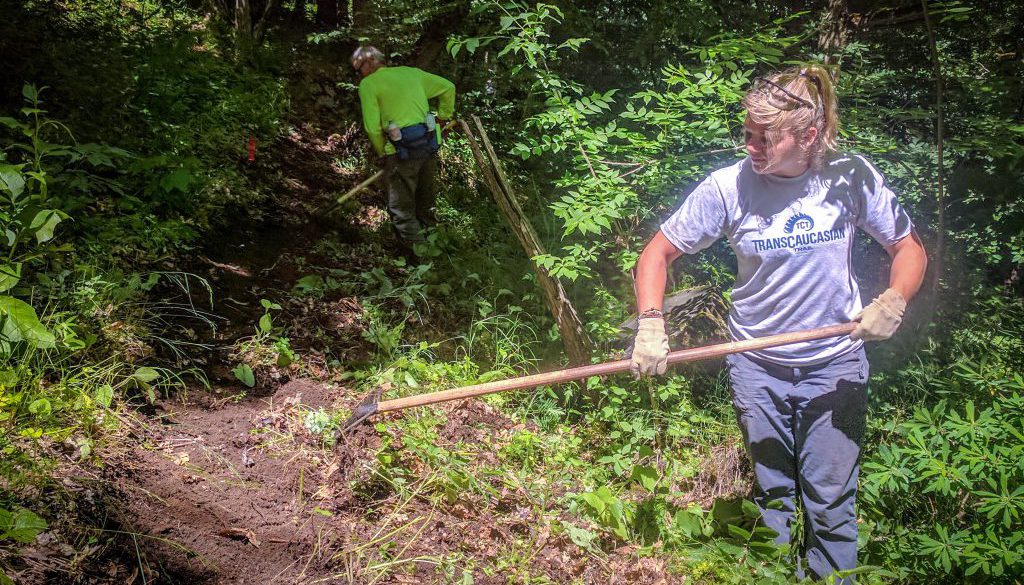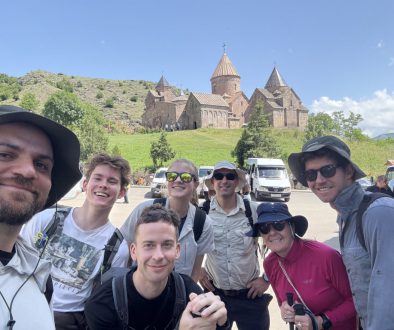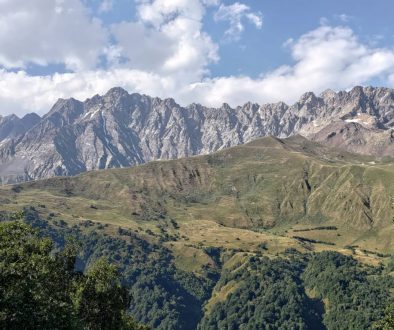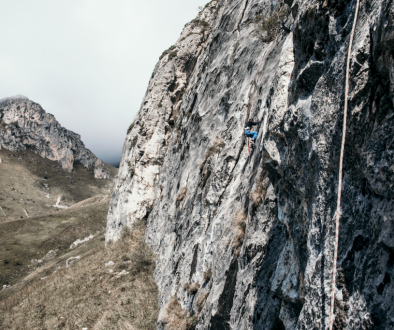Volunteer Story: Alex, the English Teacher from Denver, Colorado
This is the 1st instalment in a series of Q&As with past TCT volunteers. The aim of this series is twofold: to provide information about what it is like to volunteer with us, and to preserve our antics for posterity.

Age: 23
From: Denver, Colorado, USA
Occupation: English teacher in Sri Lanka and avid hiker and rock climber
Appeared on: the team edition of the show American Ninja Warrior
Project volunteered for: Dilijan (Armenia) trailbuilding camp 2017
TCT: This is a grassroots project with a marketing budget of precisely zero. Given that, how did you first hear about the Transcaucasian Trail?
Alex: I heard about the trail through my best friend from high school, Addie. We wanted to plan a trip over the summer because, living on opposite ends of the country, we are rarely able to spend time together. Her friend Leah had volunteered on the trail in Georgia the previous summer and had posted something on Facebook. When Addie told me about the project, I was really excited to get involved. In short, word of mouth.
TCT: It’s quite a commitment to travel to a brand new part of the world to contribute your time and energy to something completely new! What motivated you to join the project as a volunteer?
Alex: I was motivated, in part, by Armenia’s gorgeous scenery. In terms of travelling ambitions, I have to admit Armenia was never really on my radar. But knowing so little about the country added to the appeal. I’ve always been drawn to the mountains and the remoteness of the project added an element of adventure.
TCT: Many people would think twice about signing up for two weeks of hard labour in the mountains and sleeping rough! What were you hoping to gain from the experience?
Alex: For me, hard labor and sleeping rough were two incentives rather than deterrents. I’d started the summer with a few interspersed camping trips and a week-long white water canoeing trip on the San Juan. My goal was to spend more time outside than in! Really, I just wanted to spend as much time as I could outdoors and see somewhere new.
Also, I liked the idea of being a part of something so big. Addie (aforementioned friend) and I were saying how cool it would be to come back when the trail is completed. It will be fun to walk those stretches we worked so hard on and see how the seemingly endless hours of hacking at roots became part of such a fully-fledged experience.

TCT: Had you ever volunteered or worked on anything similar to this before? How did your time with us compare to your expectations or previous experiences?
Alex: I had done some previous volunteering with an organization called The Access Fund in Colorado. Part of their mission includes maintaining trails to help keep climbing areas open. The few days I spent with them were mostly trash pick-up and raking and it didn’t at all prepare me for the experience in Dilijan.
There, in Colorado, there was already an established trail. We’d moved debris and large rocks, but, while it was challenging, most of the effort came from hiking the pre-existing trail. In Dilijan, we were starting from nothing. There were some flags in a forest and that was it. So it was definitely a very different experience. We had to rake and hack (and then do it again and again and again) until something resembling a trail emerged from all those hours of raking and hacking.
In comparison, the two seemed worlds apart, but trail building felt so much more rewarding because of how different the result was from what we were coming in to.
TCT: What were the best and worst aspects of being part of the volunteer trail building crew in Dilijan?
Alex: I can honestly say being a part of the trail crew was one of the best things I’ve ever done. The people it attracts come from such diverse backgrounds and are all drawn to the project for their own unique reasons. I had such a blast meeting the fellow volunteers and getting to know them over the two weeks we spent together. I’ve kept in pretty close touch with a few of them since the trip and will forever be grateful for the lifelong friendships this opportunity has afforded.
I don’t really have any negative takeaways from the trip. The feeling of community was so strong and [the project leadership team] Tom and Tenny and Ben and Victoria were all so welcoming it was honestly really hard to leave. We celebrated Tom’s birthday my first Saturday there and I have this really vivid memory of sitting on the steps outside the headquarter house. I was drinking a beer and listening to the sounds of the party; I was surrounded by some of the most beautiful scenery I’ve ever encountered, and down below I could hear people laughing and music playing—everyone part of this family so effortlessly created out of people who were previously strangers. The weather was perfect, not cold but not hot and the sun was just starting to set. When I think about my trip, I think about that moment and of feeling totally, blissfully content.

The bugs were less than ideal. I had about 100 midge bites concentrated on my lower back just from leaning over for 2 minutes to light a fire. During the first week it was worse. We set up camp in the trees to try and stay clear of the rain, but the end was result was that no one stayed in the public spaces because the bugs were too bad. Later, when we moved camp to a more open area, everyone stayed up late and talked around the fire well after dinner. We were the first group out so I think that was just part of the learning process as no one knew what would work.
One thing I really appreciated was how much input we had. When Addie and I threw a (small) fit about the bug situation we found a new camp and the second week was much more pleasant. I thought the 5:30 am wake up call would be an issue, but I quickly adjusted to the new rhythm.

TCT: Trail work is a largely thankless task, which if done properly will never be noticed by the people who benefit from it! Where, if anywhere, did your sense of reward come from?
Alex: It doesn’t really bother me to know those hiking the trail won’t know what happened to make each of their perfect “5 degree outslope” steps possible. My favourite part of the day was when we had finished the work and were walking back to camp. At times, I’d feel disheartened because I’d felt like we’d been working on the same root system all day long, but we’d walk back and every day the walk would get a little longer. And then the next day it would be longer still. It started as a 5 minute hike in and by the end it took us 45 minutes to get back to camp. Each day, the trail started to feel more real. When Hans or Tom would cruise past a completed section on a bike, it was so cool to think that just one week previously there’d been nothing there but a leaf and branch covered hill.
TCT: The biggest trail building operation ever launched in Armenia was accomplished entirely by the labour of volunteers such as yourself. How does that make you feel?
Alex: It makes me feel great! I’m always so excited to talk about the project; people I meet are always very intrigued. I feel very proud to have been a part of something so ambitious.
TCT: We’re assuming that if you’re willing to be interviewed, you mostly enjoyed your time with us! Who would you recommend our volunteer programme to?
Alex: I loved volunteering and would recommend it to anyone who isn’t afraid of a little hard work. You can’t really sugar coat it and say it was all fun and games because there were a lot of moments of complete exhaustion. But I’d certainly recommend the experience to anyone who appreciates the outdoors. Armenia has some of the most beautiful landscapes I’ve ever seen.
Also, to any hiking enthusiasts, as it’s really cool to gain an understanding of what goes into building trails. I had no idea what all it took and I have a new appreciation for them now! But, in all honesty, there are few people I wouldn’t recommend the experience to.

TCT: Do you have a story you’d like to share with us that didn’t make it into any of your other answers?
Alex: I think there are too many stories (haha), but, Addie and I did have a good laugh after the news interview for [the main national TV station] Armenia 1. My hand had started acting up close to the end of the second week and so, by the end of the trip, it was too weak to hold even a rake. My work gloves had holes in them and I had these really bad blisters where the fabric had torn. My right palm was swollen; pain shot up through my forearm each time I went to grab a tool. It was on the second to last day that fatigue beat pride and I was forced to tell Tom and Hans.
They’d handed me some ibuprofen and a set of loppers (a demotion even from my rake). It was kind of slow going for me that day and when I found Addie she seemed to be in a similar mood. When I asked if she was ok she said, “I’m so tired and so hungry I think I’m going to cry,” and before she could finish the sentence, she burst into tears.
10 minutes later we were sitting at the base of a tree picking the chocolate out of a bag of trail mix. Tom and Hans found us and said they were sending us back early to be on security duty at the campsite.
Addie and I talked about it and she was like, “I know they’re only doing this because we’re crying and complaining about our hands. So that makes me not want to. But, then again, I am really tired and really hungry.”
I agreed. So we began the trek back to camp to complete security detail. Most days, this job was non-existent. Considering we were in the middle of a remote mountain range that only a handful of Soviet-era vehicles in Armenia can access, the camp wasn’t in any real danger. However, that day, a news crew had made their way up with one of Dilijan’s park rangers so, for the first time in almost two weeks, there was actually something to guard.
On our way back to camp, it started raining and we were drenched by the time we made it up the final hill to the campsite. The news crew was supposed to film that day, but the rain was making it difficult, so they were just waiting beneath the tarp. We looked so out of place next to the Armenian news anchor. She was young and pretty and wearing nice clothes. Her face was completely made up and her shoes were white.
In contrast, Addie and I hadn’t bathed in about a week. Our wet hair was plastered to our faces, dirt from the trail had turned to mud that coated our skin and clothing, and we were panting slightly from our climb. Our first order of business was boiling water for coffee and finding food so we barely mumbled a hello to the out-of-place woman and her cameraman.
She asked us about Tom and the project and we gave some awkward answers. And then she asked, “is trail building for women?” And Addie, the stronger feminist of the two of us, immediately said, “Of course!” I followed her lead and said, “Women are just as capable as men.”
The lady looked pretty doubtful. I think Addie and I felt similar forms of anger towards the question. At the time, it seemed fairly unwarranted because, in our heads, trail building was for women. She had just caught us on a bad day.
Later, we laughed when we thought back on the interview. After all, we did have to have a half-day because my hand hurt and because she was hungry. And we were crying and eating chocolate while the rest of the crew worked. So, there’s that.
(I do stand by what I said, however, and I’d still recommend trail building to women, too. Just tell them to bring plenty of chocolate!)
TCT: Anything else?
Alex: Shoutout to Kchuch!
[Editor’s note: Kchuch is a restaurant in Dilijan where the TCT crew would go out for dinner on the Saturday after the first week of trail building. All love and shoutouts are completely warranted!]

Click here to read more about volunteering opportunities with the Transcaucasian Trail this summer!






